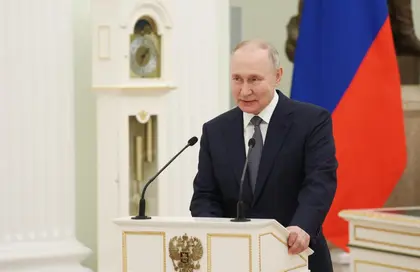Vladimir Putin on Saturday announced he would deploy tactical nuclear weapons in neighbour and ally Belarus, once again stoking fears of a dramatic escalation of Russia’s full-scale invasion of Ukraine.
JOIN US ON TELEGRAM
Follow our coverage of the war on the @Kyivpost_official.
His decision has been made in part by a suggestion from the U.K. that it could supply Kyiv with depleted uranium ammunition.
Earlier this week, Putin said: “I would like to note that if all this happens, then Russia will have to respond accordingly... The collective West is already starting to use weapons with a nuclear component.”
So it’s actually Ukraine and its allies who are escalating things?
No, there’s a massive difference between depleted uranium ammunition (DU) and actual nuclear weapons. Kyiv Post has a detailed explainer that you can read here, but as the U.K. Ministry of Defence (MoD) stated, Putin’s assertion was “deliberately trying to disinform” people about the nature of DU ammunition.
The material has been used in both ammunition and tank armor for decades by the U.K., the U.S. and Russia. “It is a standard component and has nothing to do with nuclear weapons or capabilities,” the MoD added.
Where does the hypocrisy come in?
Since announcing his decision to station tactical nuclear weapons in Belarus, Putin has all of a sudden developed a deep concern for the ecology and people of Ukraine.

Finns Probing Ship from Russia for ‘Sabotage’ of Power Cable
Discussing DU weapons in an interview with TASS on Saturday, the Russian president said: “[The use of these weapons] will generate dust, including polluting the sown areas in the regions where they will be used.”
“In this sense, it can be attributed to the most harmful and dangerous weapon for a person.
“Not only for combatants, for combatants, for the environment and for people living in this territory.”
Surely launching a full-scale invasion has been “harmful and dangerous” to Ukraine’s people and ecology as well?
Exactly. According to the United Nations, at least 8,000 Ukrainian civilians have been killed since February of last year and “the true number is likely to be substantially higher.”
Then there is the ecological damage, the extent of which is only just beginning to be known.
A new report released this week identified numerous types of environmental damage caused by Russia’s full-scale invasion of Ukraine, proving the devastation is not limited to the brutal destruction of people and their places, but Ukraine’s environment as well.
Different Russian military tactics have different impacts on different environmental contexts.
The report, for example, notes that increased air pollution is a result of Russian targeting of “oil depots, power plants, communication infrastructure and large industrial facilities that support [Ukraine’s] economy and defence capability… Burning of electrical equipment at such enterprises pollutes the environment with polychlorinated biphenyls (PCBs) and dioxins… a group of toxic and persistent chemicals that negatively affect human health” including adverse impacts on reproduction and nervous systems, and by causing cancer.
What has Ukraine said?
Kyiv hasn’t commented specifically on Putin’s faux concern for the environment but on Sunday did say Russia was holding Minsk as a "nuclear hostage".
"The Kremlin took Belarus as a nuclear hostage," the secretary of Ukraine's National Security and Defence Council, Oleksiy Danilov, wrote on Twitter.
He added that the move was "a step towards the internal destabilization of the country".
Back in February 2022, Minsk allowed the Kremlin to launch its invasion of Ukraine from his country's territory. Fears have since risen that Belarus may join its ally's offensive, but Lukashenko said he would do so "only if attacked".
For Danilov, Putin's announcement "maximizes the level of negative perception and public rejection of Russia and Putin in Belarusian society".
You can also highlight the text and press Ctrl + Enter






